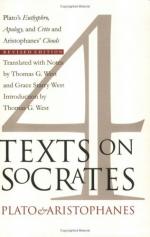
|
| Name: _________________________ | Period: ___________________ |
This quiz consists of 5 multiple choice and 5 short answer questions through Plato's Crito.
Multiple Choice Questions
1. What verdict does the jury deliver in Socrates' trial?
(a) It was the equivalent of a hung jury.
(b) Innocent.
(c) Guilty.
(d) Guilty by reason of mental disease.
2. According to Socrates, what is dangerous about the conclusion that human good is related to what is dear to the gods?
(a) Human good is only separated from human evil by a hair.
(b) The gods are unknowable, making this conclusion merely speculative.
(c) Any conclusion about human good should include societal values.
(d) The gods may hate humans, making this conclusion suspect.
3. What famous text succeeded in tarnishing Socrates' reputation, dealing him a blow in his trial?
(a) Medea.
(b) Apology.
(c) The Clouds.
(d) Crito.
4. Citizens could not be good individuals without what?
(a) Happiness.
(b) Religion.
(c) Science.
(d) Laws.
5. How does Socrates try to prove that the Athenian definition of corruption is defective?
(a) By showing that he pursues a good life in a proper way.
(b) By asking the prosecution to produce concrete evidence of the alleged corruption.
(c) By arguing that laws are meant to be broken.
(d) By calling forth a large number of his students to testify.
Short Answer Questions
1. Which is NOT one of the benefits of law, according to Socrates in Crito?
2. According to Socrates in Crito, what happens when individuals disagree on the matter of obeying or disobeying laws?
3. What does Socrates discover when he speaks with and interviews "wise men"?
4. Where does Crito take place?
5. What does Socrates tell his friends and supporters after his sentence is decided?
|
This section contains 387 words (approx. 2 pages at 300 words per page) |

|




